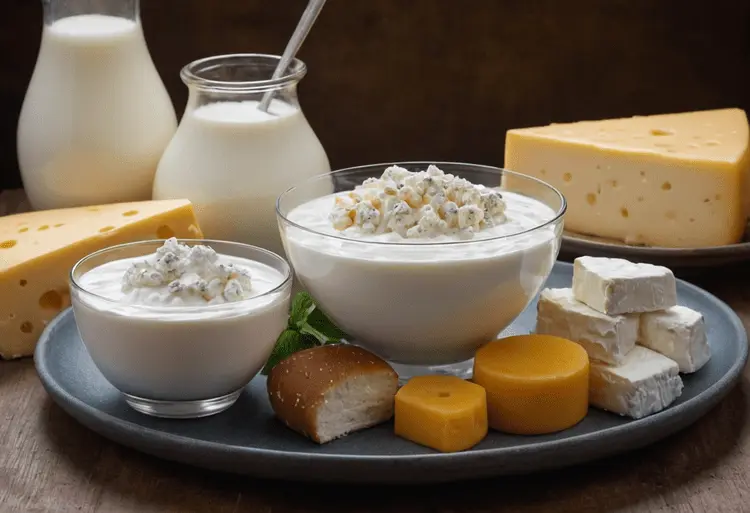Dairy proteins, found in milk, yogurt, and cheese, are your secret weapon for achieving your fitness goals. Packed with all nine essential amino acids, they’re the ultimate complete protein source your muscles crave.
Whether you’re a gym enthusiast, a casual exerciser, or simply looking to boost your overall health, understanding dairy proteins is key. We’re talking whey protein for post-workout recovery, casein protein for sustained muscle building, and milk protein for all-around nutrition.
Ready to unlock the power of dairy proteins for your health and fitness journey? Let’s dive into the science behind these incredible nutrients and explore how you can easily incorporate them into your diet, including delicious high protein dairy foods.
Dairy Proteins in a Nutshell
- Complete protein source
- Builds & repairs muscles
- Improves bone health
- Increases satiety
- Boosts immune function
Table of contents
Unleash the Power of Dairy Proteins: Your Ultimate Nutritional Ally

Ever wondered what makes dairy such a staple in diets worldwide? Or why athletes swear by their protein shakes? The answer might lie in a nutritional powerhouse you’re already familiar with: dairy proteins.
Going Beyond Muscles: Dairy’s Nutritional Symphony
But hold on – dairy proteins offer much more than just muscle gains. They’re like a multi-tool in your nutritional toolbox, supporting everything from bone health to a strong immune system. Curious to learn more?
Let’s dive into the creamy goodness and uncover the secrets of these amazing proteins.
The What and the Why: Dairy Proteins 101
So, what exactly are dairy proteins? Simply put, they’re the building blocks found in milk and dairy products, essential for growth, repair, and overall well-being. Not all proteins are created equal, though.
Dairy proteins boast exceptional bioavailability, meaning your body can easily absorb and utilize their nutrients.
If you’re looking to boost your protein intake, dairy is a top contender, thanks to its complete amino acid profile. This means it provides all the essential amino acids your body needs but can’t produce on its own.
A Duet of Protein Power: Casein and Whey
Dairy proteins come in two main forms: casein and whey. Casein is the slow-digesting type, keeping you feeling full and satisfied. Whey, on the other hand, is quickly absorbed, making it ideal for post-workout recovery.
More Than Just Macros: Dairy’s Nutritional Riches
But wait, there’s more! Dairy proteins pack a punch beyond their protein content.
They’re a good source of calcium, vitamin D, and other essential nutrients. Plus, emerging research suggests dairy peptides, smaller protein fragments, may offer additional health benefits.
Craving plant-powered muscle? Don’t miss our guide to incomplete proteins! Learn how to maximize your plant-based diet for strength and vitality.
The Science of Dairy Proteins: Unleashing the Power Within
Ever wondered what exactly makes dairy proteins so unique? It’s not just about the protein content—it’s about the intricate composition and how your body uses it.
Casein and Whey: A Dynamic Duo
Two major players make up dairy’s protein powerhouse: casein and whey. Imagine casein as the slow and steady tortoise, releasing amino acids gradually to fuel your muscles over time.
Whey, on the other hand, is the hare, quickly absorbed and providing a rapid protein boost.
What does this mean for you? Whether you’re an athlete looking for recovery or simply aiming for sustained energy, dairy proteins have your back. But what exactly are these proteins made of?
Amino Acids: The Building Blocks of Protein
Now, let’s zoom in even further. Amino acids are the individual building blocks that make up proteins. Just like a house needs different materials for its foundation, walls, and roof, your body needs different amino acids for various functions.
Dairy Proteins: The Complete Package
Guess what? Dairy proteins deliver all the essential amino acids your body can’t produce on its own. This makes them a “complete” protein source, unlike some plant-based options that might be missing a few key players.
But that’s not all! Emerging research suggests that dairy peptides, smaller fragments of proteins, might offer additional health benefits.
From Farm to Fuel: How Dairy Proteins Are Formed
So, how do these remarkable proteins end up in your milk, yogurt, or protein shake? It all starts on the farm, where cows graze on lush pastures. The nutrients they consume are transformed into milk, which naturally contains a rich blend of casein and whey.
During processing, these proteins can be isolated and concentrated to create protein powders and other products. But whether you’re enjoying a glass of milk or a scoop of whey protein, you’re tapping into nature’s protein factory.
Nutritional Powerhouse
Ever wonder about the nutritional value of dairy proteins? Let’s break it down:
- High-Quality Protein: Packed with all the essential amino acids.
- Bioavailable: Easily digested and absorbed by your body.
- Micronutrients: Contains calcium, vitamin D, and other essential nutrients.
Whether you’re building muscle, managing weight, or simply prioritizing your health, dairy proteins are a versatile and nutritious choice.
Got a question about dairy proteins? Drop a comment below, or tag us on social media! We’re here to help you unlock the full potential of this nutritional powerhouse.
Fueling Your Body with Dairy Proteins

Let’s get practical. How can you seamlessly weave the muscle-building, bone-boosting power of dairy proteins into your daily meals and snacks? It’s easier (and tastier) than you think.
Dairy Delights: A Symphony of Protein-Packed Options
Think dairy proteins are just about boring shakes? Think again! The dairy aisle is brimming with delicious, protein-packed choices.
Craving something creamy? Greek yogurt packs a protein punch, especially when topped with nuts and berries. Prefer a savory snack? Cottage cheese is your protein-rich friend, perfect with veggies or fruit.
And don’t forget the classic glass of milk, a simple yet effective way to get your dairy protein fix.
Thinking Outside the Carton: Creative Dairy Protein Adventures
But wait, there’s more! Dairy proteins are incredibly versatile. Toss whey protein powder into your morning oats for a sustained energy boost. Blend cottage cheese into pancake batter for fluffy, protein-packed goodness.
Sprinkle parmesan cheese on your salads for a savory twist and an extra protein kick.
But what if you’re lactose intolerant? Don’t worry, you’re not left out! Lactose-free milk, yogurt, and cheese options are readily available, ensuring you can still enjoy the benefits of dairy proteins.
Your Personal Protein Power Plate: Finding Your Perfect Balance
So, how much dairy protein do you need? It depends. Your age, activity level, and dietary goals all play a role. Generally, active individuals and older adults may benefit from higher dairy protein intake.
For reference, a single serving (1 cup) of milk provides around 8 grams of protein. That’s about 16% of the recommended daily intake for an average adult.
Not sure how much dairy protein is right for you? Consult a registered dietitian or use online tools to calculate your personalized needs.
Dairy Proteins and Health: Your Body’s Best Friend?
Ever wondered how athletes recover so quickly? Or why your grandma swears by a glass of milk for strong bones? The secret might lie in the power of dairy proteins.
But let’s not get ahead of ourselves. What exactly do dairy proteins do for your health? And is all the hype justified?
Muscle Matters: Pump Up the Protein Power
We all know protein builds muscle, but did you know dairy proteins are particularly effective? This is due to their unique blend of amino acids, the building blocks of protein.
A meta-analysis of numerous studies reveals that dairy protein, especially when combined with resistance training, can significantly boost muscle mass and strength. So, if you’re hitting the gym, consider adding a protein shake to your routine.
Bone Builders: Strong Bones, Stronger You
Remember your grandma’s advice? Well, she might be onto something. Dairy products are a rich source of calcium, a mineral essential for bone health.
But here’s the kicker: dairy proteins enhance calcium absorption, making your bones even stronger. This is particularly important for women, who are at higher risk of osteoporosis.
Beyond the Physical: Metabolic Magic
Dairy proteins aren’t just about muscles and bones. They also play a crucial role in metabolic health.
Emerging research suggests that these proteins may help regulate blood sugar levels, reduce appetite, and even promote weight loss. A comprehensive review of studies on dairy protein and muscle growth delves deeper into this fascinating topic.
Immunity Boost: Your Body’s Defense System
Feeling under the weather? Dairy proteins might be able to lend a hand.
Certain components in dairy, like lactoferrin, have been shown to have immune-boosting properties. While more research is needed, incorporating dairy into your diet could be a tasty way to support your immune system.
Nutritional Nuggets: Fueling Your Body
Interested in the nitty-gritty? Here’s a quick snapshot of what you get from a serving (28 grams) of whey protein powder:
- Calories: 110
- Protein: 24g
- Fat: 1g
- Carbohydrates: 2g
Addressing Controversies and Concerns

Have you ever wondered about the whispers surrounding dairy proteins? Perhaps you’ve heard concerns about hormones, environmental impact, or even allergies. Let’s take a deep dive into these swirling rumors and uncover the truth.
Hormone Hysteria: Are We Eating Hormones?
Are you concerned about the hormones in your dairy products? The answer might surprise you. Yes, cows naturally produce hormones, but the amount in milk is negligible.
In fact, you produce far more hormones naturally than you would ever consume from dairy proteins.
Antibiotic Anxiety: Are We Ingesting Antibiotic Residues?
Worried about antibiotics in your dairy proteins? Fear not! Stringent regulations and rigorous testing ensure that milk is free of harmful antibiotic residues before it reaches your glass. You can confidently enjoy your dairy protein without this concern.
Environmental Impact: Is Dairy Protein a Planet Problem?
Curious about the environmental impact of dairy farming? It’s true, there are challenges, but the dairy industry is actively working towards more sustainable practices.
What can you do? Choose brands committed to sustainability. Look for certifications like “Certified Humane Raised and Handled” or “Animal Welfare Approved.”
Allergies and Intolerances: Is Dairy Protein Right for Everyone?
Do you experience discomfort after consuming dairy proteins? It might be lactose intolerance, a common condition where your body has trouble digesting lactose, the sugar in milk.
However, this doesn’t mean you have to miss out on the benefits of dairy proteins. Lactose-free milk, yogurt, and cheese are widely available, and whey protein isolate is virtually lactose-free.
Remember: If you have concerns about allergies or intolerances, it’s always best to consult with your doctor or a registered dietitian.
Want to build muscle without the moo? Discover the best plant-based protein sources to fuel your workouts and nourish your body, no dairy required!
Your Burning Dairy Protein Questions, Answered!
Curious about dairy proteins? You’re not alone!
There are two main types: whey and casein. Whey digests quickly, while casein provides a slower release of amino acids.
Greek yogurt, cottage cheese, and milk are excellent sources. Even hard cheeses like cheddar pack a protein punch!
Yes! It’s a complete protein, supporting muscle growth, bone health, and more. It can be a valuable part of a balanced diet.
A classic protein shake with milk or whey protein powder is a great example!
Absolutely! Whey protein is a fast-digesting protein, packed with essential amino acids for muscle growth and repair.
Definitely! Lactose-free milk, yogurt, and hard cheeses are low in lactose, and whey protein isolate is virtually lactose-free.
Moderation is key. Excessive protein can strain your kidneys, especially if you have pre-existing issues. Consult a healthcare professional for personalized guidance.
Whey is quickly absorbed, ideal post-workout, while casein digests slowly, providing sustained amino acid release. Combining both offers the best of both worlds.
It depends on your age, activity level, and goals. Generally, 15-25 grams per meal or snack is a good starting point.
Both offer valuable protein, but dairy proteins are “complete,” containing all nine essential amino acids your body can’t produce. Plant-based proteins often lack one or more of these.